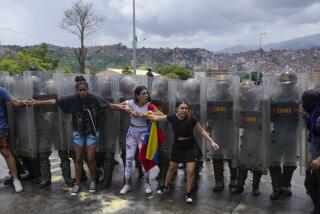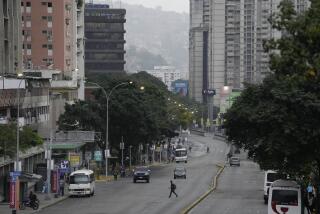Cambodian Regime Balks as U.N. Names Royalists as Election Victors : Asia: Phnom Penh refuses to accept results. There is a move to form a breakaway state.
- Share via
PHNOM PENH, Cambodia — The United Nations on Thursday officially declared the opposition royalist party the winner of Cambodia’s national elections, but the Phnom Penh regime said it still could not accept the results.
In an apparent effort to bolster the Phnom Penh government’s hand, two of its leading members--Prince Norodom Chakrapong, a deputy premier, and Sen Song, a minister of national security--were reported to have left the capital for the southern province of Prey Veng, where they threaten to set up a breakaway “autonomous state” with dissident police elements to protest the election outcome.
There were peaceful demonstrations Thursday in three Cambodian towns. Protesters in Kompong Cham, Svay Reng and Prey Veng condemned the United Nations’ conduct of the May 23-28 election. U.N. reports said many of the demonstrators were armed police officers or government soldiers.
Efforts to form an interim administration to govern after the election failed to break a deadlock over composition of the government. But the royalist party, known as FUNCINPEC, and the Phnom Penh regime now appear willing to form a coalition.
“I wish to make the strongest possible plea to all of you to bury the hatchet of yesterday, to cease mutual recriminations forthwith and to concentrate from now on upon building a new Cambodia, based on genuine fraternity and concord,” Yasushi Akashi, head of the 15-month U.N. peacekeeping effort here, told the parties.
According to figures released by Akashi at a meeting of the Supreme National Council, a reconciliation body that has loose sovereignty over Cambodia, the FUNCINPEC party won 45.47% of the 4 million valid votes cast, while the Phnom Penh regime’s Cambodian People’s Party got 38.22% and a third opposition party won 3.81%
Under the system of proportional representation agreed on in the Paris peace accords in October, 1991, FUNCINPEC will receive 58 seats in the new, 120-seat Constituent Assembly, the Cambodian People’s Party gets 51 seats and the Buddhist Liberal Democratic party gets 10 seats. A small party called Molinaka and Naktaorsou Khmere for Freedom, made up of royalist soldiers who broke away from FUNCINPEC, gets one seat.
The Constituent Assembly has three months to draft a new constitution and form a new government. Approval of the constitution requires a two-thirds vote, which means that deadlock can be avoided only if the two major parties cooperate.
Premier Hun Sen of the Phnom Penh regime said that even though his party refused to accept the election results, those of his party elected to the Assembly will take their seats and work on the draft constitution.
The new Assembly is scheduled to open Monday.
But Hun Sen warned that final adoption of the constitution and creation of a new government depend on “the satisfactory resolution of the allegations of massive electoral irregularities.”
Last week, his government demanded new elections in four provinces because of allegations of irregularities in transportation and storage of ballot boxes. The charges coincided with early returns that showed the regime losing.
The United Nations responded that while there were logistic problems in the voting, there was no evidence of fraud sufficient to affect the outcome.
Many Western and Cambodian observers see the Phnom Penh regime’s rejection of the results as a bargaining ploy to secure a significant role in any future government.
Similarly, the alleged plan by Chakrapong, a widely disliked son of Prince Norodom Sihanouk, the country’s chief of state, to form a separatist state appeared to be another bargaining chip. At the meeting Thursday, Hun Sen was reported to have remarked that if an investigation into voting irregularities is conducted, the secessionist plan might be dropped.
An attempt last week to form a government headed by Prince Sihanouk collapsed after only six hours when FUNCINPEC rejected the notion of sharing power equally with the Phnom Penh regime and demanded that the new government’s composition reflect the election results.
Prince Norodom Ranariddh, Sihanouk’s 49-year-old son and the head of FUNCINPEC, told reporters Thursday that he is willing to serve in a joint administration with the Phnom Penh regime, but not on an equal basis with Hun Sen. He said Sihanouk had proposed a compromise Wednesday night in which Ranariddh would serve as prime minister and Chea Sim, head of the Cambodian People’s Party, would be deputy prime minister. But Chea Sim rejected the idea.
There were signs that Cambodian soldiers are closer to cooperation than its politicians. The commander of the Phnom Penh government army and those of two rebel factions based near the border with Thailand met in Phnom Penh, and a U.N. spokesman said they agreed to submit to a supreme commander to be appointed by the new Assembly. It was unclear when the unified command would be implemented.
More to Read
Sign up for Essential California
The most important California stories and recommendations in your inbox every morning.
You may occasionally receive promotional content from the Los Angeles Times.










